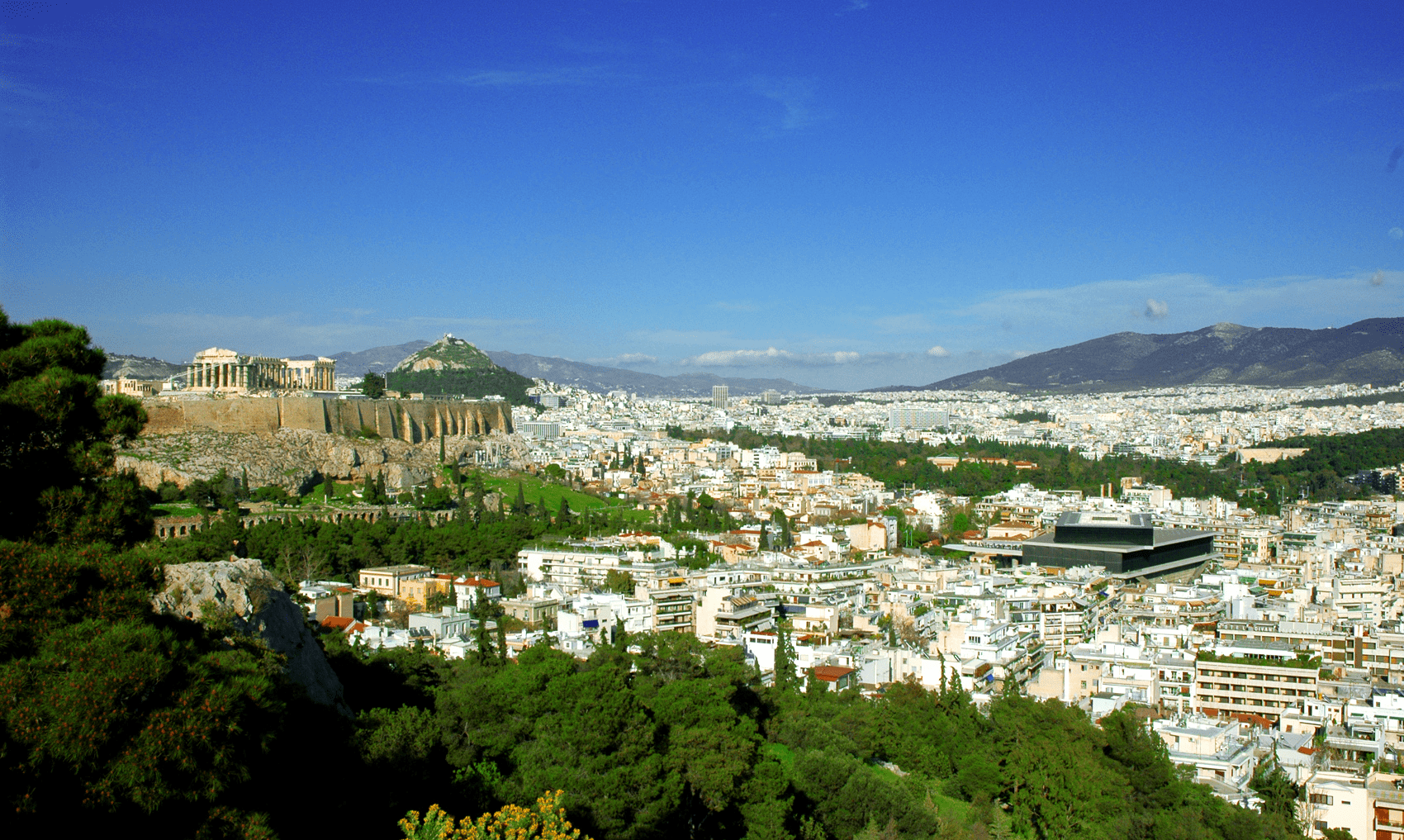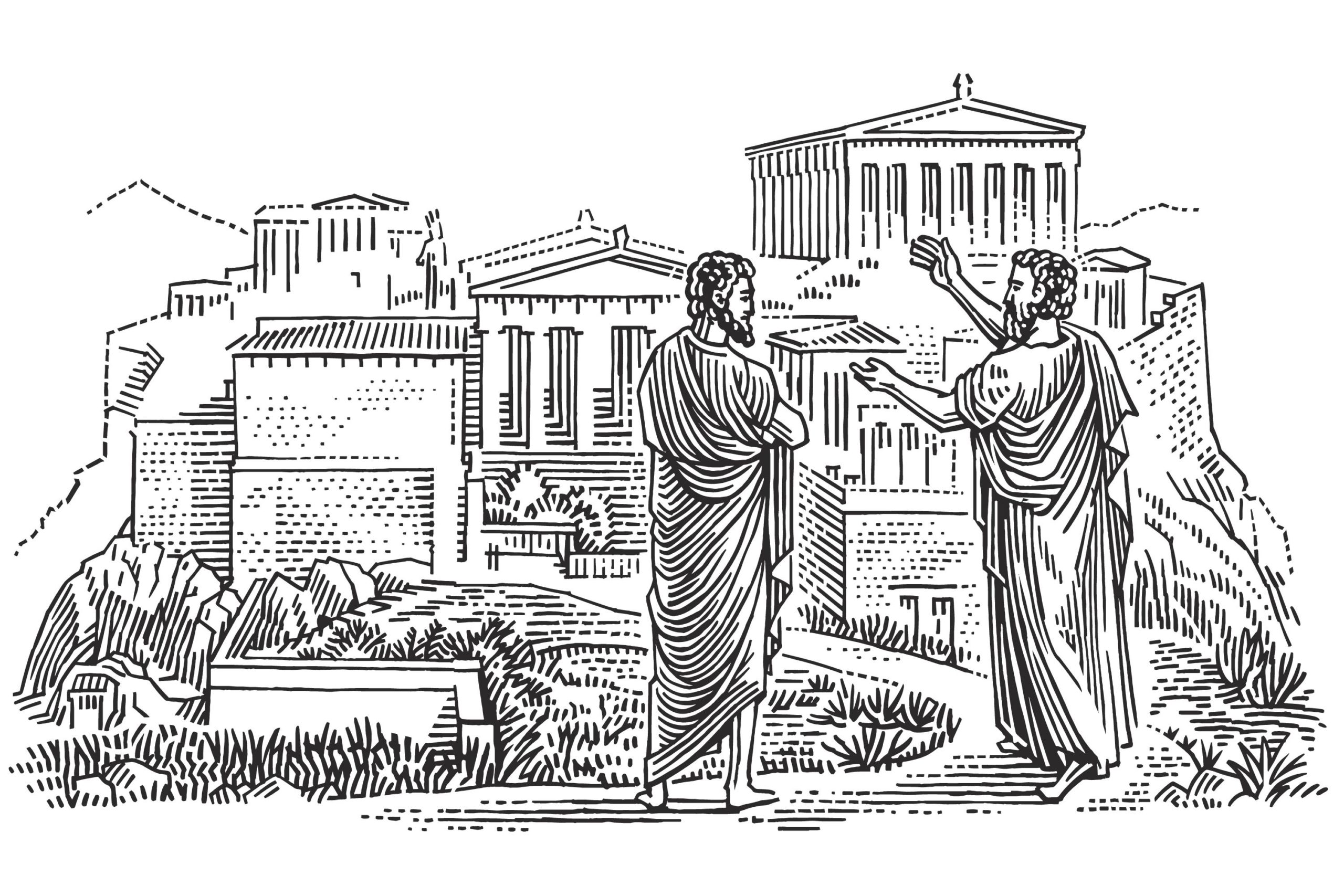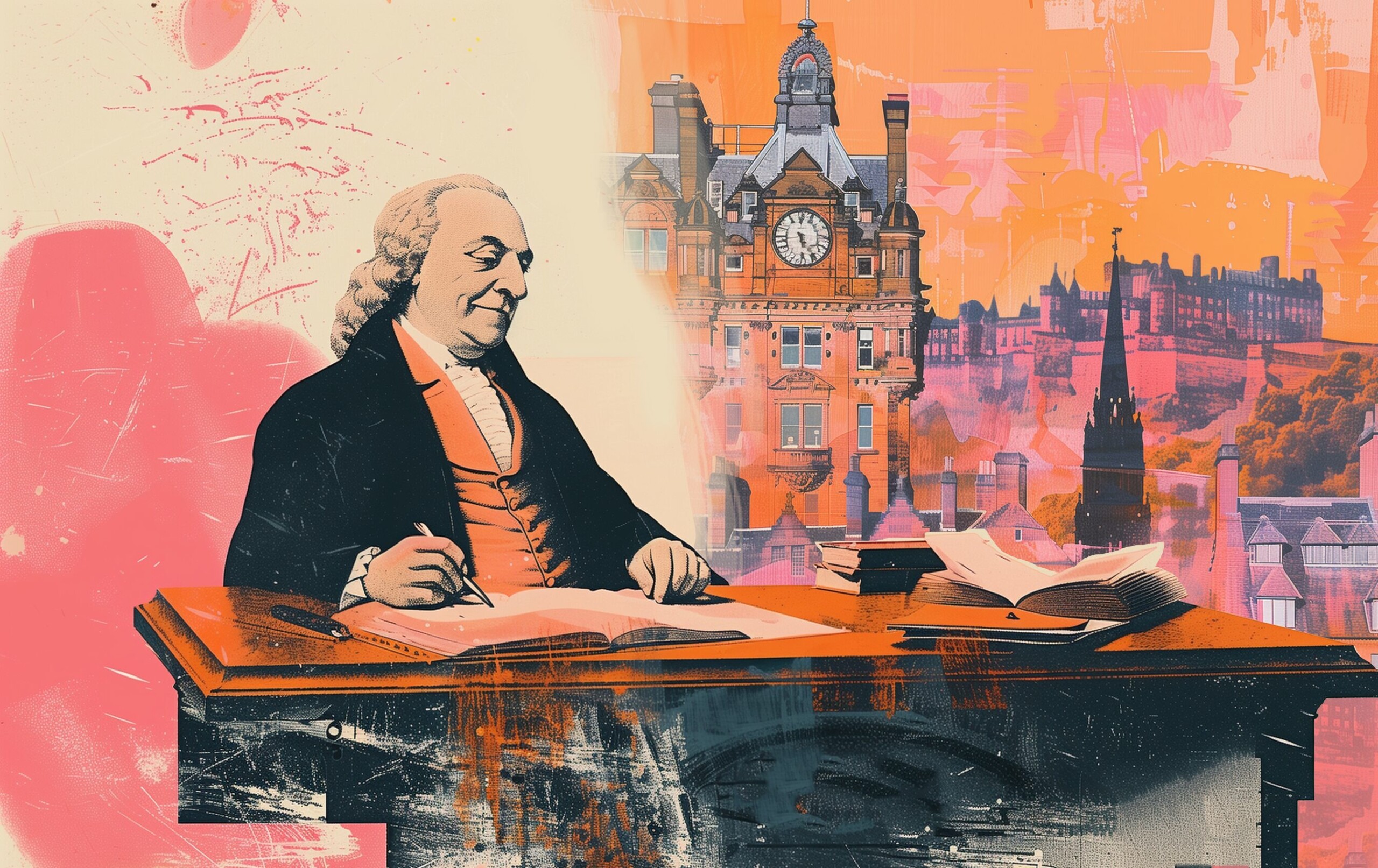Today marks the seventh installment in a series of articles by HumanProgress.org called Centers of Progress. Where does progress happen? The story of civilization is in many ways the story of the city. It is the city that has helped to create and define the modern world. This bi-weekly column will give a short overview of urban centers that were the sites of pivotal advances in culture, economics, politics, technology, etc.
Our seventh Center of Progress is Athens during the Classical era (the 5th and 4th centuries BC) in general and particularly the golden age of peace and cultural flourishing between the end of the Persian Wars and the start of the Peloponnesian War (449 BC to 431 BC). The city-state of Athens greatly valued intellectual pursuits and open inquiry, leading to the development of “philosophy” meaning the love of wisdom. Athenian philosophy encompassed natural philosophy (i.e., an attempt to understand the natural world), as well as moral philosophy or ethics, metaphysics or theories about the fundamental nature of existence, and political philosophy. Athens was also the world’s first (if restricted) democracy, and has been nicknamed “the cradle of Western civilization.”
While the concept of empirical research took off only after the Scientific Revolution began at the end of the Renaissance, the ancient Athenians’ devotion to understanding themselves and the world around them represented a significant intellectual breakthrough in human history. By recognizing the importance of debate and truth-seeking, Classical Athens inspired countless thinkers over the succeeding millennia and heavily influenced the world we all live in today.
Today, Athens is the capital of and the largest city in Greece. It is also one of the biggest economic centers in southeastern Europe. Moreover, it is a home to Piraeus—the world’s second largest passenger port. Over 600,000 people live in the city proper, while the greater Athens metropolitan area houses around 3.75 million inhabitants. Athens is a major tourism center due to its many well-preserved historic sites. The city has been called “the historical capital of Europe.” Athens contains two different UNESCO World Heritage Sites, the Acropolis of Athens and the medieval Byzantine Dafni Monastery.
Athens likely gets its name from the Olympian goddess of wisdom, Athena, who was also the city’s patron deity. Some scholars think that it is the other way around and that the goddess gets her name from the city. Depicted as a beautiful, but stern-faced, maiden clad in either a flowing chiton or full armor, Athena was also paradoxically the goddess of both war and peace, as well as the goddess of craftsmanship and weaving. The famous Parthenon temple on the Acropolis was built to honor her and to serve as the city’s treasury, with construction starting in 447 BC and decoration of the structure continuing until around 432 BC. Another large temple to Athena, built around 420 BC in the Ionic architectural style, also stands in a prominent position on the Acropolis.
The Acropolis is among the most distinctive features of today’s Athens surviving all the way from the 5th century BC. It is a cluster of buildings on a rocky outcrop overlooking the city. If you could visit Athens during the 5th century BC, you would have been struck not only by its majestic architecture, but by the city’s liveliness and energy. The beating heart of Athens was its marketplace, or Agora, meaning “place where people gather.” In the bustling and noisy Agora, located to the northwest of the Acropolis, you would have witnessed people not only exchanging goods and services, but also ideas.
The structures surrounding the market stalls of the Agora included a series of stone benches, various altars and temples (notably the Temple of Hephaestus), a building called the Aiakeion (named for a judge of the underworld in the Greeks’ mythology) where laws and legal decisions were displayed, and various stoas or covered porticos. The Royal Stoa displayed the full legal code of the city, while the Painted Stoa (so-called because it was covered in artworks) served as a gathering place to watch jugglers, sword-swallowers, fire-eaters, and other entertainers—but also orators and philosophers, who drew large crowds. (The Stoic school of philosophy draws its name from the structure).
Among the permanent and temporary stalls of the Agora you would have seen goods for sale including food, wine, oils, furniture, clothes, leather sandals, perfume, and products from faraway lands brought in through Athens’s well-situated port. You would have been able to buy wood from Italy, grain and linen from Egypt, dates from Phoenicia, ivory from North Africa, and spices from Syria. During the 5th century BC, Athens was an unusually open society, far more open than other Greek city-states. It was arguably the world’s first global city. As bestselling author Eric Weiner put it in his book The Geography of Genius, “This openness made Athens Athens. Openness to foreign goods, odd people, strange ideas.”
Athens embraced relatively free and wide-ranging trade, exchange of ideas, and the incorporation of foreign-born people into their society. Free foreigners living in Athens, called metics (the rough equivalent of resident aliens), enjoyed considerable social mobility and were able to attain high-status roles. The Athenians borrowed many of their ideas from abroad, importing the Phoenician alphabet, Egyptian medicine and sculpture techniques, Babylonian mathematics and Sumerian literature. The Athenians often improved upon what they borrowed. For example, while the Egyptians invented the art of sculpting statues, it was the Greeks who first carved truly realistic, lifelike human forms from stone. The philosopher Plato summed it up when he said, “What the Greeks borrow from foreigners, they perfect.”
However, many of the foreign-born people in Athens were not free. Slavery was ubiquitous throughout the ancient world, and Athens was no exception. In the Agora you would have been horrified to see human beings offered up for sale. Nearly all of the enslaved people in Athens were not of Greek origin, but were what the Greeks called “barbaroi” (“barbarians”) from abroad, often captured in conflicts from farther north. Many slaves thus had fair pigmentation that distinguished them from the native Athenian population, who tended to have dark hair and olive skin. Names like Xanthias (meaning “blond”) and Pyrrhias (meaning “redhead”) became virtual synonyms for “slave.”
Most Athenian slaves suffered greatly, although the institution was relatively fluid compared to other Greek city-states at the time. Other Greeks were sometimes shocked at the blurring of boundaries between enslaved and free persons in Athens, or what the author now known as Pseudo-Xenophon called the “uncontrolled wantonness” of Athens’s “equality between slaves and free men, and between metics and citizens.” He was horrified to find that in Athens, some people legally classified as slaves accumulated great wealth, while some free people were terribly poor, thus obfuscating the distinction between slaves and free persons.
Walking away from the Agora, you would have come upon the limestone Bouleuterion, or meeting place of the Senate. The Senate was composed of five hundred Athenian citizens, chosen by lottery to serve for a year-long term. They met in the assembly building every day (with the exception of festival days) to prepare legislation for the review of the ekklesia, or assembly of all voting citizens.
Often called the first democracy, Athens allowed each of its adult male citizens a vote when deciding upon official policies. In the mid-5th century BC, the number of eligible voters was perhaps as high as 60,000. (That population would decrease significantly during the Peloponnesian War, when many Athenian men perished). Still, that was no more than 10 to 20 percent of the city’s population, with the majority of Athenians being excluded from political participation due to their sex or citizenship status. Metics, women and slaves were given no vote. While the world’s first democracy was deeply flawed, the Athenian experiment influenced the evolution of modern representative democracies.
In the 5th century BC, Athens served as the home to a great number of geniuses and innovators, including the playwrights Aeschylus, Sophocles and Euripides, the historians Thucydides and Herodotus, the physician Hippocrates (credited with creation of the Hippocratic Oath) and the hugely influential philosophers Socrates and Plato.
Socrates developed the “Socratic method” of inquiry, which uses questions to stimulate critical thinking, draw out ideas and unveil assumptions. During the 18th century Enlightenment, many thinkers, including Voltaire, drew inspiration from Socrates, who was upheld as an early advocate of reason. Plato became the father of the philosophical school of thought known as idealism, and is often considered to be the founder of Western political philosophy.
Socrates’s persistent and public questioning of prominent Athenians often left the latter looking foolish, making the former many enemies. After the defeat of Athens in the Peloponnesian War by Sparta and its allies, Athenian society entered a period of social and intellectual upheaval in which the city’s commitment to free speech and open inquiry wavered. Perhaps in part looking for a scapegoat for the city’s various misfortunes, accusers charged Socrates with “impiety” and “corruption of the youth.” The philosopher was sentenced to death. Ironically, the same city that arguably served as the world capital of philosophy and critical thinking ultimately executed a man for the crime of simply asking questions.
Before the arrival of philosophy, society largely focused on immediate and practical concerns, and did not devote significant amounts of time or effort to seeking out knowledge for its own sake. Philosophy represented a shift in priorities in intellectual life. By valuing wisdom as its own end, Athens encouraged people to devote their minds to contemplation of (and development of systematic theories about) morality, society, the workings of the universe, etc. Human beings are intrinsically curious, but Athens helped to elevate curiosity to a moral imperative.
It also created institutions to support the inquisitive nature of mankind. By the 4th century BC, Athens could also count the philosopher Aristotle (a student of Plato’s) among its luminaries and became home to the forerunners of modern universities. Those forerunners included Plato’s Academy, the first true institution of higher learning in the Western world and a prototype for later universities, and the Lyceum, a temple that served as a center for education, debate and scholarship.
Today, Athens is still best-known for its far-reaching influence as an intellectual center of the ancient world. The image of Athens in the popular imagination is perhaps best summed up by the famous 16th century fresco titled The School of Athens. Created by the Italian Renaissance artist Raphael to decorate the Apostolic Palace in the Vatican, the painting depicts many of the most influential Athenian philosophers of the Classical era engaged in passionate debate with one another, writing down their ideas, passing on their knowledge to pupils, or otherwise devoting themselves to the pursuit of truth.

Athens played a key historical role in promoting the importance of open inquiry, reason, debate and the pursuit of truth. Athens created centers of scholarship that were the forerunners to modern university systems, established a new approach to understanding the natural world that acted as the precursor to modern science, and experimented with a new system of government that would one day inspire the creation of modern representative democracy. For heightening humanity’s “love of wisdom,” Athens is rightfully our 7th Center of Progress.



